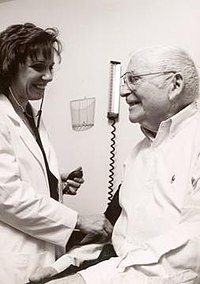
Photo from wikipedia
BackgroundPolypharmacy and potentially inappropriate medications (PIMs) are increasingly common and associated with adverse health effects. However, post-graduate education in polypharmacy and complex medication management for older adults remain limited.ObjectiveThe Initiative… Click to show full abstract
BackgroundPolypharmacy and potentially inappropriate medications (PIMs) are increasingly common and associated with adverse health effects. However, post-graduate education in polypharmacy and complex medication management for older adults remain limited.ObjectiveThe Initiative to Minimize Pharmaceutical Risk in Older Veterans (IMPROVE) polypharmacy clinic was created to provide a platform for teaching internal medicine (IM) and nurse practitioner (NP) residents about outpatient medication management and deprescribing for older adults. We aimed to assess residents’ knowledge of polypharmacy and perceptions of this interprofessional education intervention.DesignA prospective cohort study with an internal comparison group.ParticipantsIM residents and NP residents; Veterans ≥ 65 years and taking ≥ 10 medications.InterventionIMPROVE consists of a pre-clinic conference, shared medical appointment, individual appointment, and interprofessional precepting model.Main MeasuresWe assessed residents’ performance on a pre-post knowledge test, residents’ qualitative assessment of the educational impact of IMPROVE, and the number and type of medications discontinued or decreased.Key ResultsThe IMPROVE intervention group (n = 18) had a significantly greater improvement in test scores than the control group (n = 18) (14% ± 15% versus − 1.3% ± 16%) over a period of 6 months (Wilcoxon rank sum, p = 0.019). In focus groups, residents (n = 17) reported perceived improvements in knowledge and skills, noting that the experience changed their practice in other clinical settings. In addition, residents valued the unique interprofessional experience. Veterans (n = 71) had a median of 15 medications (IQR 12–19), and a median of 2 medications (IQR 1–3) was discontinued. Vitamins, supplements, and cardiovascular medications were the most commonly discontinued medications, and cardiovascular medications were the most commonly decreased in dose or frequency.ConclusionsOverall, IMPROVE is an effective model of post-graduate primary care training in complex medication management and deprescribing that improves residents’ knowledge and skills, and is perceived by residents to influence their practice outside the program.
Journal Title: Journal of General Internal Medicine
Year Published: 2019
Link to full text (if available)
Share on Social Media: Sign Up to like & get
recommendations!